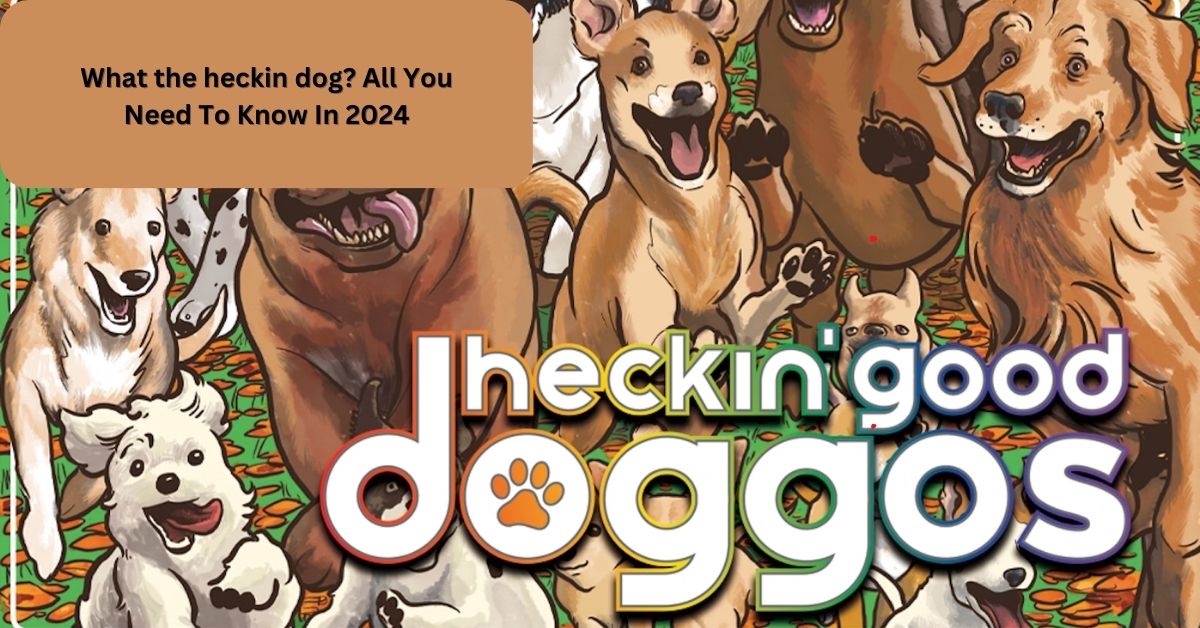Hackin’ dog” is an informal slang term used to express affection or enthusiasm for dogs, particularly cute or quirky dogs. It’s commonly seen in internet memes and viral images featuring adorable pups, conveying a feeling of pure, overwhelming cuteness.
The term blends “hecking” or “heckin’,” which is a toned-down version of a stronger expletive, with “dog.” Essentially, it means something like “incredibly adorable dog.” It serves as a way to highlight intense excitement, admiration, or positivity towards our beloved canine companions.
The Structure and Grammar of “Heckin’ Dog”
Grammatically, “heckin’” is an intensifying adjective modifying the noun “dog.” It originated in online subcultures as a more catchy and less explicit alternative to saying something like “very cute dog.”

Structurally, it consistently includes:
“Heckin’ “ – An endearing intensifier “Dog” – A reference to a canine companion It’s often, though not always, followed by a positive adjective such as “good,” “cute,” or “sweet.”
Here are some examples:
| Example |
| “Look at this heckin’ good doggo!” |
| “That’s one heckin’ cute pup!” |
| “What a heckin’ sweet doggie!” |
In essence, it’s an enthusiastic exclamation about an exceptionally adorable dog.
The Origins of “Heckin’ Dog”
“Hackin’ dog” first emerged in the early 2010s on social media platforms such as Tumblr and Reddit, gaining popularity within online “doggo speak” meme culture.
| Social Media Sites | Early 2010s |
| Tumblr | Early 2010s |
| Early 2010s |
Early Internet Slang Roots:
Internet slang was already evolving, with terms like “doggo,” “upper,” and “floor” becoming popular ways to describe dogs humorously or endearingly.
“Heckin’” had been circulating as a substitute swear word for some time before merging with dog memes. It allowed users to convey heightened excitement – akin to words like “f***ing” or “fricking” – without using profanity.
| Internet Slang Roots | Description |
| Doggo | Humorous way to refer to dogs |
| Upper | Part of dog-related internet slang |
| Floor | Part of dog-related internet slang |
Evolution Through Doggo Memes:
Platforms like Reddit’s /r/rarepuppers community provided the ideal “heckin’ dog” environment to thrive. Users shared images and videos of adorable dogs accompanied by captions featuring exaggerated internet-speak. Describing the dogs as “heckin’” emphasized their overwhelming cuteness.
While there may not have been a single pivotal moment when the words were first combined, the phrase gained prominence as doggo memes peaked around 2015, becoming ingrained in online dog culture.
| Online Circles | /r/rarepuppers community |
| /r/rarepuppers | |
| Online Dog Culture | Around 2015 |
Why “Heckin’” Instead of Other Intensifiers?
What distinguished “heckin’” was its inherent silliness and cleanliness. Unlike words like “damn” or “freaking,” it lacked any harshness or negativity.
It was simply nonsensical and enjoyable – perfect for expressing the joyous absurdity of dog behaviour on the internet.

This unique quality allowed “heckin’ dog” to become a standout combination, highlighting the dog’s extreme cuteness and the internet’s peculiar fascination with canines.
Also Read: Navigating On-Call Pay: Essential Information for Employers
Why Do People Use “Heckin’ Dog”?
People use “heckin’ dog” for several reasons:
| Reasons | Description |
| To Be Cute or Funny | Using “heckin’ dog” is about adding cuteness or humor. It embraces absurdity to bring joy. |
| To Express Affection | It’s used earnestly to convey warmth and enjoyment of dogs. Similar to saying, “I love this dog!” |
| For Emphasis | “Heckin’” strengthens the descriptive word after “dog,” emphasizing positive canine qualities. |
| Trendiness & Cultural Capital | Using hip internet slang like “heckin’ dog” shows membership in trendy online circles. |
How is “Heckin’ Dog” Used?
People use “heckin’ dog” across various online contexts, including:
| Usages | Description |
| Commenting on Cute Dog Photos | Used in social media comments to express cuteness overload in response to cute dog photos. |
| Captions for Dog Memes | Often used as captions for image macros and viral dog videos, complimenting the dog’s appearance. |
| Hashtag Usage | Hashtags like #heckindog or #heckinpuppers are used to track or spread dog-related social media content. |
| Spicing Up Informal Writing | It’s incorporated into informal communications like texts or chat messages to add meme-y zest. |
heckin’ Dog” in Popular Culture:
Since its online inception, “heckin’ dog” has made its mark in mainstream films, brands, and creative media.
| Medium | Examples |
| Poems & Songs | Gabrielle Aplin’s 2022 track “Hackin’ Puppers n’ Doggos” and indie poems feature the term. |
| Movie/TV Appearances | In a 2016 episode of “New Girl,” a character praises adopting dogs by saying, “heckin’ humane dude.” The 2018 Netflix rom-com, “The Kissing Booth,” also includes the term. |
| Brand Marketing | Brands like Wendy’s, Pedigree, and BarkBox use “hackin’ dog” language on social media. |
| Merchandise | Stickers, pins, mugs, and t-shirts featuring “heckin’ dog” cater to devotees of dog culture. |
The Impact of “heckin’ Dog”:
“Hackin’ dog” has had meaningful – and divisive – impacts on the internet and dog culture:
| Impacts | Description |
| Fostering Doggo Subculture | “Hackin’ Dog” breeds subcultures around viral dog content and memes. |
| Creating Community | It helps create connections and community among dog lovers worldwide. |
| Annoying Detractors | The silliness of the phrase annoys detractors, reflecting broader responses to internet slang. |
| Driving Real World Dog Crazes | Viral dog obsession drives surges in dog ownership, especially for trendy breeds. |
Also Read: Scaling Your Business with White Label Lead Generation Software
The Future of “heckin’ Dog”:
The future of “hackin’ dog” involves:
| Predictions | Description |
| Maintaining an Online Presence | It will likely remain prominent online, upheld by meme-literate youth. |
| Offline Decline | Usage offline may wane over time as cultural trends evolve. |
| Evolution & Adaptation | New forms and connotations may emerge, extending beyond just dogs. |
| Lasting Cultural Residue | It will persist as an artifact of early 21st-century internet culture. |
Alternative Terms to “heckin’ Dog”:
Similar slang terms include:
| Alternative Terms | Description |
| Good Boy/Girl | Simple praise for delightful dogs without the memetic tone. |
| Dodge/Doggie | Traditional cutesy suffixes for emphasizing pup cuteness. |
| Other Doggo Variants | Variants of doggo terminology carrying similar connotations. |
| Cute-Adjacent Terms | Words like “adorable,” “sweet,” “lovely,” and “darling.” |
| Foreign Translations | Translations in other languages like Japanese, Spanish, French, and Nepali. |
The Psychology of “Hackin’ Dog”:
The fusion of “hackin’” and “dog” resonated deeply due to:
| Psychological Factors | Description |
| Cultural Obsession with Dogs | Dogs are deeply ingrained objects of widespread cultural affection. |
| The “Cute Response” | The overwhelming delight and affection humans demonstrate towards cute phenomena. |
| Absurdist Internet Humor | “Hackin’ dog” aligned with surging online absurdist humor, generating surprise and joy. |
Ultimately, “hackin’ dog” amalgamated human quirkiness in the digital age, spotlighting the internet’s unique cultural sway.
Final Thoughts:
In essence, “heckin’ dog” embodies a cultural phenomenon that has flourished in the internet age. This unique blend of slang enables people from different linguistic backgrounds and geographical locations to connect over their shared adoration for adorable dogs.
It also underscores the internet’s ability to disseminate quirky behaviors and modes of expression worldwide with remarkable speed.
What’s particularly intriguing is the widespread embrace of such whimsical absurdity, which speaks to humanity’s enduring appreciation for simple joy. Unlike other memes, “heckin’ dog” carries no ulterior motive beyond spreading happiness among its users.
In its gentle absurdity, it fosters a sense of connection through our shared capacity to revel in the wonderfully bizarre.
Where this phrase goes next remains uncertain, but it holds potential to serve as a conduit for spreading the meaningful moments we all cherish – lighthearted instances of joy.
FAQ’s:
Q1. When did “heckin’ dog” first emerge?
The term likely originated on social media platforms like Reddit and Tumblr in the early 2010s within doggo meme subcultures.
Q2. Who typically uses the phrase “heckin’ dog”?
Internet-savvy individuals such as millennials and Gen Z primarily participate in social media humour and meme culture.
Q3. What does it mean to call a dog “heckin’”?
It serves as an intensifier, indicating extreme cuteness, silliness, or positivity towards the dog, always conveying affection rather than negativity.
Q4. Is “heckin’” only used to describe dogs?
While dogs are the primary and most common subject, over time, “heckin’” has been extended to caption other cute animals like cats.
Q5. Why did this silly slang term gain such popularity online?
It blended widespread cultural adoration for dogs with emerging internet humour characterized by strange cuteness and nonsense.
Q6. Are some people annoyed by the spread of “heckin’ dog”?
Yes, many view doggo-speak like “heckin’” as excessively childish or representative of annoying internet culture. Detractors find it ridiculous in mainstream conversations.
Q7. Has the meme had real-world impacts beyond the internet?
Absolutely – by driving increased demand for trendy dogs like French Bulldogs. The viral online dog hype directly influences consumer purchasing behaviour.
Q7. What is the future outlook for the slang phrase?
It has demonstrated remarkable cultural resilience thus far. While unlikely to fully integrate into the offline vernacular, “heckin’ dog” will persist digitally on social platforms for years to come – possibly evolving into new animal variants.
Q8. What are some alternatives to saying “heckin’ dog”?
Simple phrases like “good boy/girl” or foreign language equivalents like “kawaii” in Japanese convey similar meanings.
Q9. Why did this combination resonate so strongly psychologically?
It resonated due to its sensitive alignment with human appreciation for cuteness, internet absurdist humor, and our intrinsically positive relationships with domestic canines throughout history.



